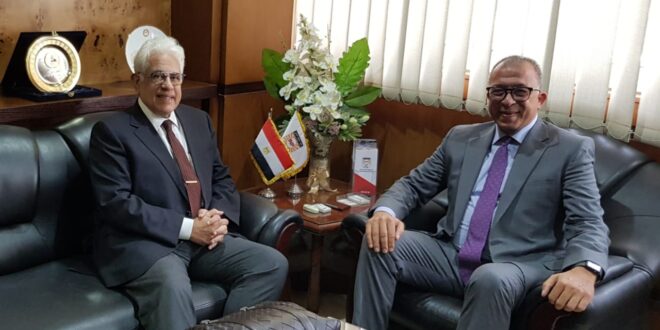At the invitation of Prof. Dr. Ashraf El-Arabi, President of the National Planning Institute, Dr. Hossam Badrawi attended today, Tuesday, April 23, 2024, as part of the activities of the sixth seminar of the seminar on the topic “Prospects for Upgrading the Pre-University Education System in Light of Technological Developments” at the Planning Institute’s headquarters, Prof. Dr. Mohamed Mahmoud Auditorium, where Dr. Hossam Badrawy gave a wonderful lecture. He began by presenting the Egypt he dreams of and his vision for its future. He pointed out that Egypt is part of the future of the world, but will it participate in creating this future or watch? Then Dr. Badrawy added that we must dream of a bright future for our country. The dream is… It is what distinguishes a person and is the mutation that made him change and innovate, confirming the statement of Dr. Abbas Mahmoud Al-Akkad: Anything that the mind imagines can happen, and whoever does not have imagination does not have the future. Then Dr. Badrawi differentiated between dreaming, imagination, and feasibility study. Feasibility study is subject to the law of mathematics and its results can be predicted. As for imagination and dreaming, the law of mathematics does not restrict them, as they have no ceiling to govern them. They surprise us with results that exceed calculations
Dr. Badrawi then explained that children are the most capable of dreaming, stressing that Egypt’s real wealth is children and youth. They rise above all wealth if we prepare them well and pave the way for them, and this is what we have now. However, he also stated that this wealth can turn into a curse if it is neglected without development. Sustainable and left to randomness to lead it.
Badrawi then moved on to Egypt’s vision for Education 2030 and its five axes, which are that high-quality education be available to all without discrimination within the framework of an institutional system that is efficient, fair, sustainable, and flexible, based on the technologically enabled learner, which contributes to building the integrated personality and unleashing his potential to the fullest extent. For a citizen who is proud of himself, enlightened, creative, responsible, open to pluralism, respects difference, proud of his country’s history, passionate about building its future and able to deal competitively with regional and global entities.
Dr. Badrawi then explained that every word that the vision carries requires a strategy to implement it, as he stated that what has been achieved with this vision so far is much less than expected and we still have a lot to accomplish, but we must not repeat our mistakes and wait for better results, using in this the quote of Albert Einstein: The difficulties and problems facing us cannot be solved or overcome with the same way of thinking that created them. Then Dr. Badrawi gave a quick presentation on the development of education from its form 100 years ago until what we have reached today in terms of progress and richness in educational tools and methods, leading to the skills that the student must possess. Today, to face the future, which he summarized in: critical thinking and the ability to solve problems, cross-border cooperation and influential leadership, flexibility and adaptability, initiative and entrepreneurship, effective oral and written communication, access to and analysis of information, curiosity and imagination. He also stressed that education is not complete. Without coexistence, art, sports, and values, and the necessity of being in agreement on a set of values, Dr. Badrawi then moved to the teachers, stressing that there is no education that rises above the ceiling of its teachers, pointing to the role of colleges of education and the promising opportunity to prepare teachers who will rise to the level of education if we are able to maximize the benefit from These colleges, focusing on them, and overcoming the challenges they face.
From the colleges of education, Dr. Badrawi moved to the shift to decentralization, which was approved by the Constitution, explaining that this shift requires time, preparation, preparation, and training, but first we must take serious steps to achieve it, which will lead us to the ability of institutions to make decisions, extrapolate their needs in the future, and prepare a plan to overcome the challenges, which It will change the reality of the dependence of each institution on another institution, all the way to the central leadership. Then Dr. Badrawi explained that the seed that grows corruption in institutions is the multiplicity of those responsible for performing a job that one person can do. Then, how does this cause a waste of state funds such that it incurs the cost of providing salaries and wages without Jadawy, then Dr. Badrawi talked about the problem of financing and presented many ideas with which we could overcome the financing challenge. Finally, Dr. Badrawi took us on an interesting tour about the impact of artificial intelligence on the educational process and the most important benefits if we use it well, as well as the challenges that can arise if It was not misused. Then Dr. Badrawi concluded his wonderful lecture, which was met with strong support and approval. Then the lecture was followed by the dialogue part, during which the audience asked a set of questions, which Dr. Badrawi answered and discussed. At the end of the meeting, the audience gathered around Dr. Badrawy to greet him and take souvenir pictures with him. In an atmosphere filled with love and appreciation
The meeting was moderated by Dr. Mustafa Ahmed Mustafa, the coordinator and scientific supervisor of the seminar
Video presentation of Dr. Badrawi by Dr. Mustafa Ahmed Mustafa, coordinator and scientific supervisor of the National Planning Institute seminar on the topic “Prospects for Improving the Pre-University Education System in Light of Technological Developments” on April 23, 2024
 Dr. Hossam Badrawi Official Website
Dr. Hossam Badrawi Official Website


